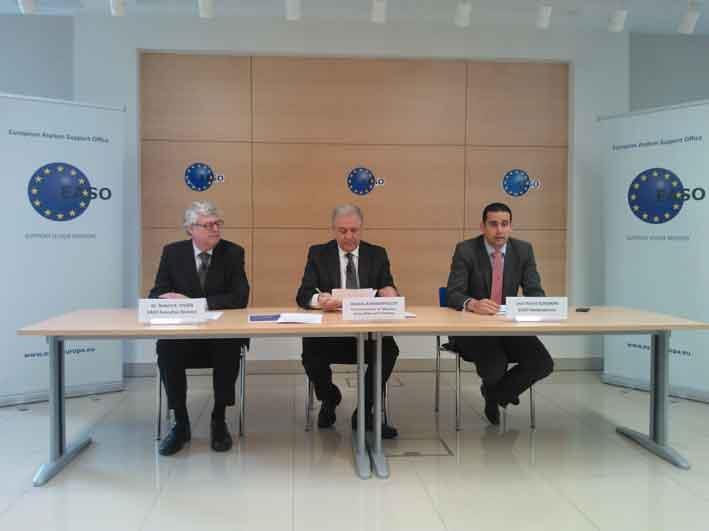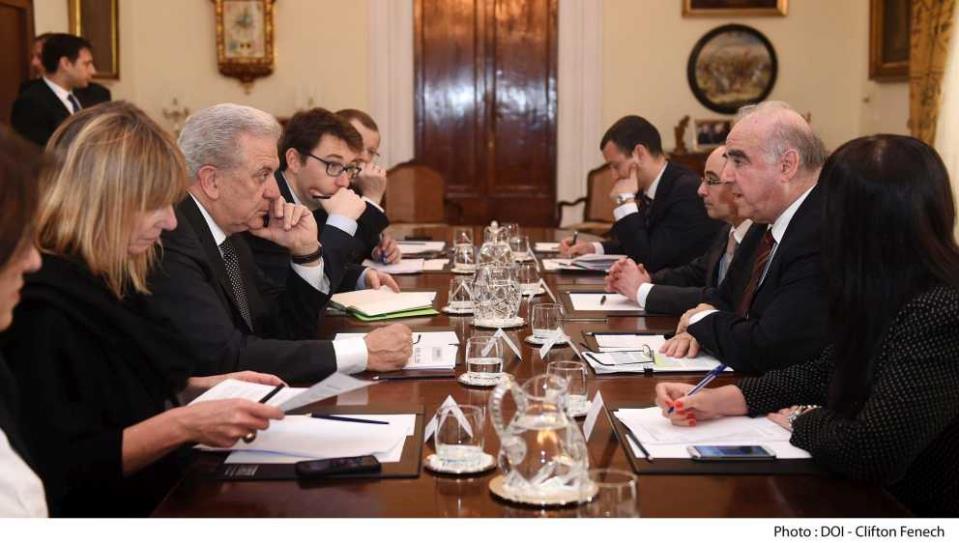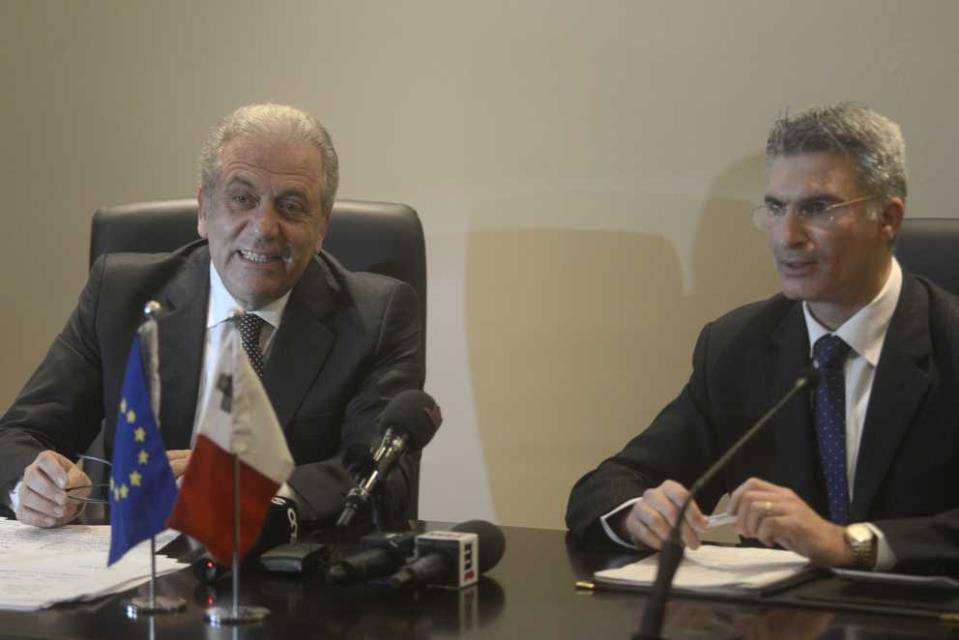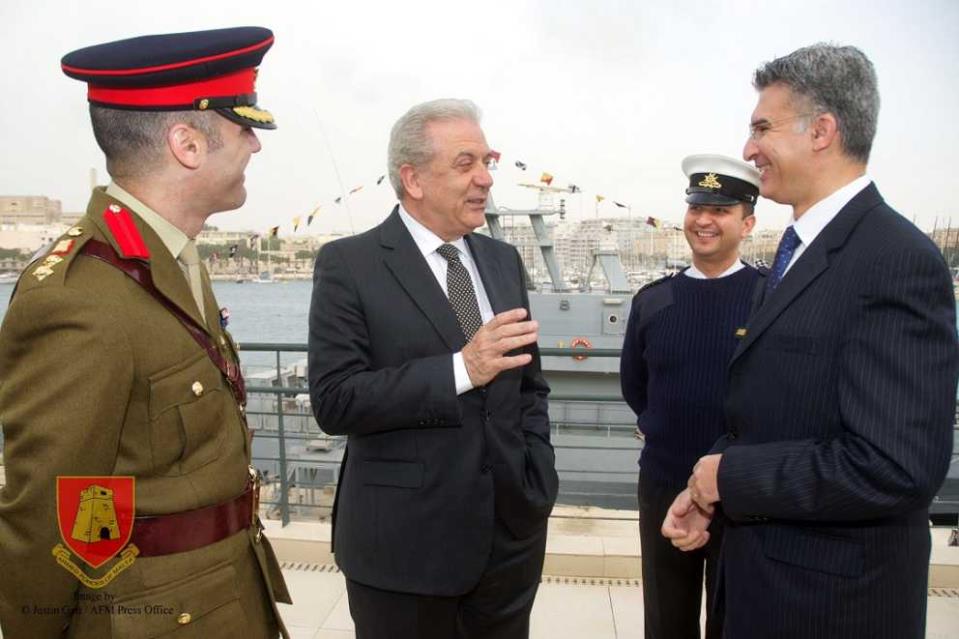European Commissioner for Migration and Home Affairs Dimitris Avramopolous today said he was not too optimistic about the situation in Libya with the country being on the verge of collapse.
Mr Avramopolous also said the European Common Asylum Policy, which will be launched in May, will offer a long-term solution to the problem of irregular migration.
He was speaking at the end of a one-day visit to Malta during which he held meetings with Prime Minister Joseph Muscat, Home Affairs Minister Carmelo Abela and Foreign Affairs Minister George Vella.
Mr Avramopoulos visited the European Asylum Support offices in Marsa this morning. “Malta is not alone on the issue of migration,” he said. “It is true that Malta did not receive enough support in the past but things are changing. The increased cooperation between member states is showing results,” he said. “Solidarity must not remain an EU slogan: it has to be shown in a tangible way.”

Mr Avramopoulos said the purpose of his visit to Malta was to show his own solidarity with Malta and said he would urge all member states to show the same support to Malta.
EASO Executive Director Robert K. Visser said the office carries out a number of important projects, which include a number of joint processing pilots with the involvement of 20 members states.
The other was a pilot project to extract data on the experiences of migrants and the methods used by human traffickers. Dr Visser said that the project, carried out by Malta and Italy, gathered important information about migrant routes and methods. “At the moment we are more interested in the systems used rather than the people behind them,” he said.
Dr Visser said the studies have confirmed that human trafficking rings are in fact very well organized, with bases in many countries. Migrants pay high prices to escape to Europe. The data collected shows that migrants could pay some $1,500 per person for a short voyage, say from Malta to Libya, and up to $6,000 for longer routes.
“This project enabled us to better understand the migrants and their facilitators,” said the Mr Avramopoulos said. “This will help our efforts to crack down on human smugglers. It helps us become more effective and efficient in the fight against human trafficking.”

The Commissioner said the information could be used to tackle the migration problem at the countries of origin, and said the first signs looked promising. He admitted, however, that the human trafficking organisations in some of these countries were even more organized than the respective governments. “Smugglers have not created a network: they have created a whole industry.”
Mr Avramopoulos said Malta has become the heart of EU solidarity. The EASO has become a very mature organization, despite being only 5 years old.
He spoke about the pilot project on joint processing of asylum applications. The number of asylum seekers in the EU, he said, peaked in 2014. There were more than 626,000 applications. “Not all EU states are being affected in the same way,” he admitted.
The EU Commissioner said the EU Common Asylum Policy will be launched in May. It will be a more holistic approach to the subject. “Our priority is to address the root causes of migration and increase cooperation between member states.”
Mr Avramopoulos said he will be discussing both migration and security with Home Affairs Minister Carmelo Abela later today. “Malta is at the heart of an instable zone stretching from the Ukraine to Tunisia.”
Mr Avramopoulos also held talks with Prime Minister Joseph Muscat at the Auberge de Castille, in which he declared that he was not too optimistic about developments in Libya and said that the North African country was on the verge of collapse.

He also said that the EU could not afford to ignore the situation in Libya, before going on to state that he was not optimistic about the developments in the region. As he started to elaborate on this point, however, the meeting was closed to the press.
In his own opening remarks, Dr Muscat said that Mr Avramopoulos' portfolio was of the utmost importance to Malta, and said that the phenomenon of migration could not be taken out of the context it was occurring in, including the situation in Libya.
He said that the government was encouraged by the "very strong message" sent by the EU Council's support to UN efforts, spearheaded by special representative Bernardino León, to achieve a diplomatic solution in Libya, and its willingness to offer assistance and intervene once a national unity government is formed in the country.
Dr Muscat stressed that the EU should continue backing Mr León's efforts rather than intervene on its own accord at present, and that one should strive to achieve a political solution rather than be alarmist about the situation. But ultimately, Mr Avramopoulos' assessment of the situation in Libya was clearly more pessimistic than Dr Muscat's own.

Earlier, he met with Foreign Affairs Minister George Vella, where the two discussed migration and the recent developments in Libya. Dr Vella spoke about the challenges presented by the influx of migrants, primarily from countries in the Horn of Africa. He called for increased involvement by the European Commission and individual EU Member States in assisting countries, which like Malta, are bearing the brunt of these influxes.
Dr Vella expressed satisfaction at the Commission’s recent allocation of €17.1 million for Malta’s National Programme Asylum, Migration and Integration Fund covering the period 2014-2020. He added that, this development is certainly a welcome step in the right direction but insisted that solidarity with Malta needs to be expressed also in terms of fair responsibility sharing.
Commissioner Avramopolous underlined his commitment to address Malta’s specific situation. He stated that, Malta’s proximity to countries going through a phase of instability has resulted in unprecedented pressures related to migration and security. The Commissioner assured that Malta has the Commission’s support in the efforts being made to address existing and prospective difficulties. Malta, he added, is not alone in this scenario and the Commission will be doing its utmost to alleviate the situation.
Mr Avramopolous addressed another press conference, this time with Home Affairs Minister Carmelo Abela, before departing. He said the Common Asylum Policy is a long-term solution to irregular migration which offered a legal guarantee of solidarity across all EU member states.
The migration problem, he said, was not one that Malta should face alone. He also spoke on the increasing number in migrant embarkations and said Europe should remain vigilant against the possibility of infiltration by terrorists.
On his part, Mr Abela welcomed the Common Asylum Policy and said Malta would turn to the EU to ask for real assistance if the need arose.
Mr Avramopolous also visited the AFM’s Maritime Squadron at their Haywharf base.